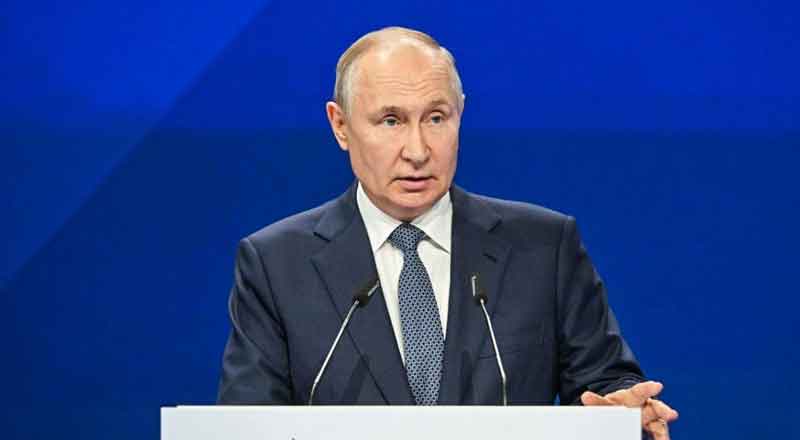- Putin warns West over nuclear powers supporting strikes
- Russia is changing its nuclear doctrine, Putin says
- Says conventional attack could lead to nuclear response
- Ukraine says Russia has only nuclear blackmail left
President Vladimir Putin issued a stark warning to the West on Wednesday, announcing that Russia’s nuclear doctrine has been expanded to address new global threats. In a significant shift, Putin emphasized that Russia could use nuclear weapons in response to conventional missile strikes and would consider any attack on its territory supported by a nuclear power as a joint nuclear assault. This decision comes amid growing discussions in the U.S. and U.K. regarding whether to allow Ukraine to launch Western missiles into Russia.
Russia’s Nuclear Doctrine Expands
In a meeting with Russia’s Security Council, Putin laid out key changes to Russia’s nuclear strategy. One of the most notable adjustments involves treating any aggression against Russia by a non-nuclear state as a joint attack if it is supported by a nuclear power. “It is proposed that aggression against Russia by any non-nuclear state, but with the participation or support of a nuclear state, be considered as their joint attack on the Russian Federation,” Putin declared. He added that any large-scale missile launch, drone strike, or aircraft assault detected by Russia could trigger a nuclear response.
The updated doctrine also extends to Russia’s ally, Belarus, ensuring its inclusion under the Russian nuclear umbrella. Putin reiterated that if Belarus or Russia is attacked, even with conventional weapons, Moscow reserves the right to retaliate with nuclear force.
Justifications for the Shift
Putin’s rationale for these changes stems from a rapidly evolving global security environment, which he believes poses new risks to Russia. The adjustments, he noted, are “carefully calibrated and commensurate with modern military threats.” Russia’s previous nuclear doctrine, established in 2020, allowed for nuclear strikes only in the event of a nuclear attack or a conventional strike that endangered the state’s existence. The new doctrine broadens the scope of threats that could prompt nuclear retaliation, marking a significant escalation in Moscow’s defense posture.
These changes come as the war in Ukraine intensifies, with Ukrainian President Volodymyr Zelenskiy urging the West to permit the use of long-range missiles, such as U.S. ATACMS and British Storm Shadows, to strike deep into Russian territory. Russia’s updated doctrine appears to be a direct response to these calls, warning that any such escalation could lead to catastrophic consequences.
The Risk of Global Conflict
The Ukraine war has brought Russia and the West to their most dangerous standoff since the 1962 Cuban Missile Crisis, the closest the world has ever come to nuclear conflict. As the war drags on, and with Russia controlling nearly one-fifth of Ukrainian territory, tensions are rising. Moscow has warned that continued Western support for Ukraine, especially if it involves crossing Russia’s so-called “red lines,” risks igniting a global war.
Putin and U.S. President Joe Biden have both acknowledged the potential for a direct confrontation between Russia and NATO to spiral into World War III. Republican presidential candidate Donald Trump has also echoed these concerns, warning of the growing nuclear threat.
Global Reactions to Putin’s Remarks
Putin’s statement has drawn sharp criticism from Ukrainian officials. Andriy Yermak, chief of staff to Zelenskiy, dismissed Putin’s nuclear threats as “blackmail” and argued that such intimidation tactics would no longer be effective. “Russia no longer has any instruments to intimidate the world apart from nuclear blackmail,” Yermak said in response to Putin’s comments.
The U.S., which controls 88% of the world’s nuclear warheads in partnership with Russia, has long been wary of Moscow’s nuclear capabilities. In 2022, the CIA warned Putin of the dire consequences if Russia resorted to using tactical nuclear weapons in Ukraine. Putin’s latest nuclear doctrine expansion, however, signals that Moscow remains committed to maintaining its nuclear deterrent as a key element of its defense strategy.
Strategic Parity and Global Power
Addressing Russia’s Security Council, Putin emphasized the importance of the country’s nuclear arsenal, which he described as the cornerstone of national security. “The nuclear triad remains the most important guarantee of ensuring the security of our state and citizens, an instrument for maintaining strategic parity and balance of power in the world,” he said.
Putin revealed that the amendments to Russia’s nuclear doctrine had been in development for over a year, reflecting the evolving military landscape and the need for Russia to adapt its defense capabilities. He reiterated that any credible intelligence of a massive aerospace attack—whether involving strategic or tactical aircraft, cruise missiles, drones, or hypersonic vehicles—would justify a nuclear response from Russia.
As the Ukraine war continues to reshape global alliances and deepen tensions between Russia and the West, Putin’s expansion of Russia’s nuclear doctrine signals a dangerous escalation. With the inclusion of conventional missile strikes and allied nations under the nuclear umbrella, the risk of a wider conflict grows. Both Russia and the West must now navigate a precarious balance, with the shadow of nuclear war looming larger than ever.
(With inputs from agencies)





